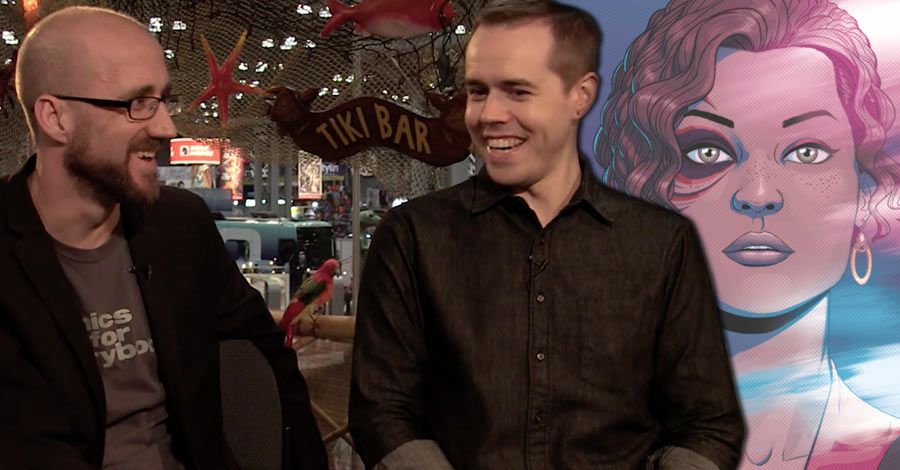Writer Kieron Gillen and artist Jamie McKelvie, the fan-favorite creators of "The Wicked + The Divine," sat down with Jonah Weiland in the CBR Tiki Room during New York Comic Con to talk about their hit Image Comics series. The frequent collaborators discuss the shorthand they've established after a decade of working together, how exactly you design a god, and what's next for the ongoing series.
On the duo's long term plans for "The Wicked + The Divine":
Kieron Gillen: Cancelation. [Laughs] The basic plan is for around probably thirty to sixty issues. My gut feeling will be about forty. That covers this incarnation of gods, as in their two years, but you know the concept was every ninety years, so we can go back -- we want to do probably a whole arc in previous generations. And that will be well down the line. But it could go longer.
The fact that the concept is as big as it is, is in the classical Vertigo ongoing model, that model of ongoing is about the idea that, "Yes it's a long story, yes we know the end, yes we know is structure," but you also use it as a device to be able to grow and respond to things you are interested in, and use it to explore what you care about. And when we were making up "Wicked + Divine" it's kind of like everything I've ever loved. And that's kind of the main thing. It's like everything I've ever learned form -- you know I just turned 59 last week, and that period of my life -- everything, I was trying to synthesize it. Synthesizing in terms of synthesizing your influences. This is kind of like the last 59 years of living pop culture has been about. And now I'm going to shoot it through the head. Laughter]
Gillen & McKelvie Introduce "The Wicked and the Divine"
On designing the look for each god in the series:
Jamie McKelvie: I don't know if it was a challenge, but it was certainly fun. I mean, we had a very clear idea of who each god was, and the influences they were influenced by. I think it was pretty solid in my head from the beginning of reading the character and what they were about. Like the design was there, pretty much straight away.
Gillen: Talk about style versus costume. That is quite interesting, I think, In that the gods don't really have costumes.
McKelvie: Yeah, obviously Lucy has gone through about four or fives suits so far. You know they're more like pop stars than super heroes so they've got a style, but not a one costume. So it's been fun coming up with different ones every time. We went to see Kate Bush a couple of weeks ago, at least two of the outfits in issue #5 are very Kate Bush influenced.
Gillen: Those Kate Bush gigs in London were a phenomenally, visionary thing. "Is this genuinely happening?"
McKelvie: You try and explain to someone, "At the end she sort of flies of on these giant raven wings," and that actually happens. [Laughing] It's basically Kate Bush the comic.
Gillen: Kate Bush looked like she was cosplaying Morrigan. It wasn't even funny.
On which character's style they like best:
McKelvie: I like to doing Morrigan, because there's the three aspects to her obviously. Similar themes in different directions.
EXCLUSIVE: Gillen & McKelvie Look Back on "Young Avengers," Prepare for "Afterparty"
On seeing the series through Laura's eyes and her loss of innocence:
Gillen: All the characters are very much aspects of me. They're influenced by lots of other stuff, but they often are mentally me trying to pick myself apart. Or pick ways I've felt, or feel, or been. And Laura's someone who wants to be a creator, and the book in many ways is about, "Why the hell did I choose to be a creator anyway? What did I learn along the way? What was I like?" And that's kind of Laura's -- I was a lot like that when I was 17. I wanted this frankly stupid thing, and I wanted it desperately. I was all kinds of naive. At the same time I'm also Cassandra, and Cassandra knows this is all nonsense. The dialectic between the two is kind of right at the heart of the book, I feel. So yes, but only in the way that anyone looses their innocence.
On how their collaboration began:
McKelvie: Bristol 2003 Comic Con, he had a table with somebody I'd done an anthology thing with and I went over to that table, he looked at my artwork and said, "I've got a comic called 'Phonogram' that you should draw." And that was it.
Gillen: You would be perfect for, I think was the words. So the initial, the first thing I said was "We should do 'Phonogram' together." And that's in fact weird. That's a weird kind of fluke of fate for our entire careers. And you think about certain bands, they've kind of had this weird chance meeting, and we definitely had that.

